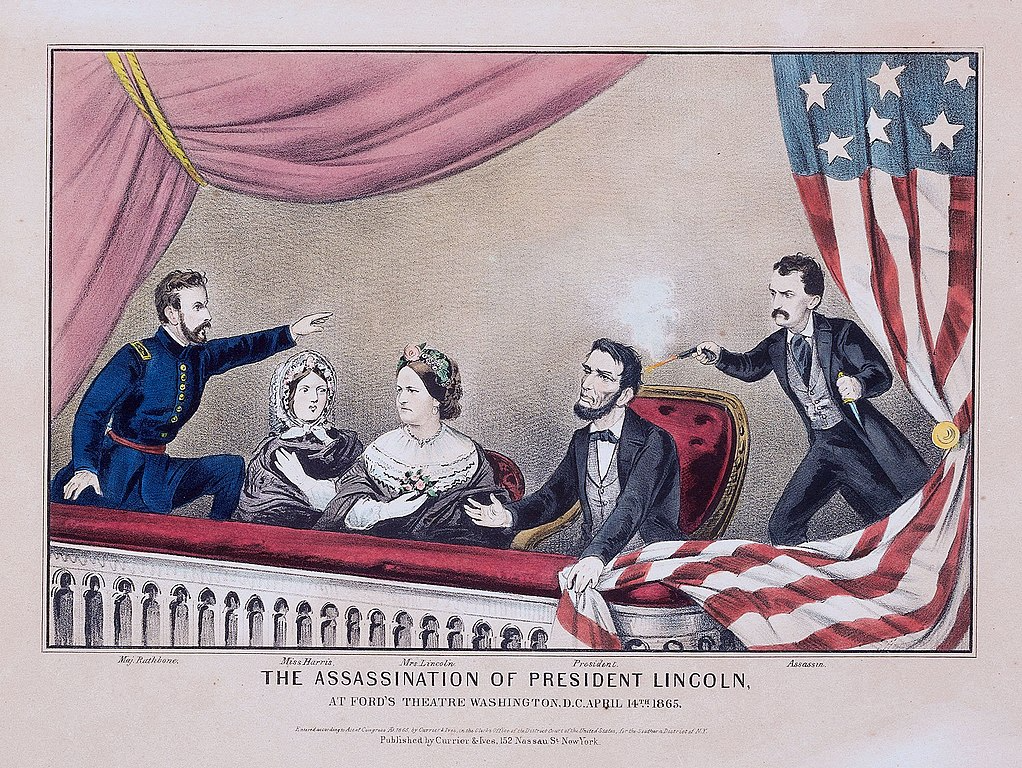
Image Credit: Currier and Ives, Public domain, via Wikimedia Commons
By Saul Roth
The assassination of Abraham Lincoln on April 14, 1865 was a seminal moment in American history. Lincoln, who had served as the 16th President of the United States since 1861, was shot by Confederate sympathizer John Wilkes Booth while watching a play at Ford’s Theatre in Washington, D.C. Lincoln’s death was a shock to the nation, and had a profound impact on the country both during and after the Civil War.
The assassination occurred just five days after Confederate General Robert E. Lee surrendered to Union General Ulysses S. Grant at Appomattox, ending the Civil War. Lincoln had been re-elected as president in 1864, and had been working to rebuild the country and bring about reconciliation between the North and the South. However, not everyone supported his efforts to bring about peace and equality for all citizens, and Booth, a well-known actor and Confederate sympathizer, saw Lincoln as a threat to his beliefs.
On the night of April 14, 1865, Lincoln, his wife Mary Todd Lincoln, and their guests, Major Henry Rathbone and his fiancée Clara Harris, went to Ford’s Theatre to watch the play “Our American Cousin.” Booth, who had been planning the assassination for months, entered the President’s box during the third act of the play and shot Lincoln in the back of the head. Rathbone attempted to intervene, but was stabbed by Booth, who then leapt from the box onto the stage and made his escape. John Wilkes Booth shouted “Sic semper tyrannis!” which means “Thus always to tyrants” in Latin when he leapt onto the stage after shooting Abraham Lincoln. It was a phrase that was commonly associated with Brutus, the assassin of Julius Caesar in Roman history, and Booth likely shouted it to indicate that he saw Lincoln as a tyrant and that the assassination was a heroic act.
Lincoln was rushed to a nearby boarding house, where he died the next morning. The news of his death spread quickly, and the nation was plunged into mourning. Lincoln’s body was taken to the White House and lay in state for three days, as thousands of people came to pay their respects. He was then taken by train to his hometown of Springfield, Illinois, where he was buried.
The assassination of Lincoln was a turning point in American history. With the President’s death, the country lost its leader at a critical moment in its history. Lincoln had been working to bring about a peaceful end to the Civil War and to ensure that the rights of all citizens, including newly freed slaves, were protected. His death left a vacuum of leadership that was filled by Vice President Andrew Johnson, who had much less political experience and struggled to continue Lincoln’s policies.
The nation was also in shock and mourning, making it difficult for the government to function effectively. The country was also facing a difficult period of reconstruction, as the South struggled to rebuild and reintegrate into the Union. Lincoln’s death also added to the sense of chaos and uncertainty that existed in the country at the time.
The assassination of Lincoln was also significant in that it marked the first time that a U.S. President had been assassinated. The event brought attention to the issue of presidential security and led to changes in how the President was protected. The U.S. Secret Service, which had previously been responsible for investigating counterfeiting, was given the task of protecting the President.
John Wilkes Booth was on the run for 12 days before being tracked down and killed by Union soldiers. His co-conspirators were arrested and put on trial. Four of them were convicted and hanged. The assasination was a reminder that the nation was still deeply divided, and that the work of reconciliation and rebuilding was far from over.
In conclusion, the assassination of Abraham Lincoln was a tragic event that had a profound impact on the country. The President had been working to bring about peace and reconciliation after the Civil War, and his death left a leadership vacuum that was difficult to fill. The nation was in shock and mourning.

Recent Comments